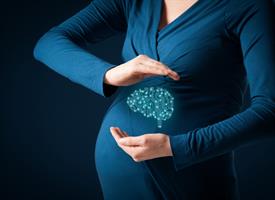In the News
New Research Seeks to Understand Link Between Iron and Brain Development
Wednesday, October 24, 2018
 Iron deficiency is the one of the most prevalent nutritional deficiencies in the world and affects mainly pregnant mothers and young children. Numerous studies have found that mothers who have low iron levels during pregnancy, have a higher risk of giving birth to a child that develops cognitive impairments like autism, attention deficit syndrome, and learning disabilities. While the link between gestational iron deficiency (GID) and cognitive impairment in offspring is well establish, the mechanisms by which this occurs remain unknown.
Iron deficiency is the one of the most prevalent nutritional deficiencies in the world and affects mainly pregnant mothers and young children. Numerous studies have found that mothers who have low iron levels during pregnancy, have a higher risk of giving birth to a child that develops cognitive impairments like autism, attention deficit syndrome, and learning disabilities. While the link between gestational iron deficiency (GID) and cognitive impairment in offspring is well establish, the mechanisms by which this occurs remain unknown.
Margot Mayer-Proschel, Ph.D., an associate professor in the University of Rochester Medical Center (URMC) Department of Biomedical Genetics, has established animal models of GID and was the first to pinpoint the critical periods of gestation during which the developing central nervous system is most vulnerable to GID. Her laboratory recently demonstrated that nerve cells in the brains of animals born to iron deficient mice behave abnormally to excitatory brain stimuli and has shown that functional impairments cannot be restored by iron supplements later in life.
Dr. Mayer-Pröschel to Research the Role of Iron Deficiency in the Developing Brain with a $2 Million Grant
Wednesday, August 29, 2018

Dr. Margot Mayer-Pröschel, Associate Professor in the Department of Biomedical Genetics, with a secondary appointment in the Department of Neuroscience, has received a $2 million, five-year grant to study the impact of gestational iron deficiency (GID) on the development of the brain.
Iron deficiency is still the most prevalent nutritional deficiency in the world. Optimal maternal iron stores during pregnancy are essential for providing adequate iron to the fetal brain. However, many women have insufficient iron reserves to optimally supply the fetus. This is a potentially serious problem as children born to gestational iron deficient (GID) mothers have a higher probability of developing autism, attention deficient syndrome and other cognitive impairments.
A major step towards understanding GID, and potentially preventing multiple types of impairment in children, is to conduct controlled mechanistic and cellular studies in animal models where variable factors can be controlled. Using this approach, the Mayer-Pröschel lab found that low iron supply during pregnancy can cause defects in fetal brain development resulting in a disability to generate appropriate reservoirs of cells that are needed later in life to establish balanced brain activity. This defect persists even if iron supplements are started at birth. This work using a mouse model of GID will provide a detailed understanding of the detrimental effects on child development and may point towards new strategies by which the defects can be normalized or prevented.
The grant, titled Gestational Iron Deficiency disrupts neural patterning in the embryo is funded by the Eunice Kennedy Shriver National Institute of Child Health & Human Development (NICHD), part of National Institutes of Health.
Neuroscience Graduate Student Awarded Messersmith Dissertation Fellowship for 2018-2019
Monday, April 23, 2018

Jessica Hogestyn, a PhD candidate in the Neuroscience Graduate Program has been awarded a $23,000 Messersmith Dissertation Fellowship for 2018-2019. The Messersmith Fellowship is a competitive one-year fellowship for students in the pre-clinical departments of the School of Medicine and Dentistry or in Biology, Chemistry, Optics or Physics. Appropriate candidates have passed the qualifying exam and are in the process of writing their dissertations or are at least engaged in full-time research.
Congratulations Jessie!!